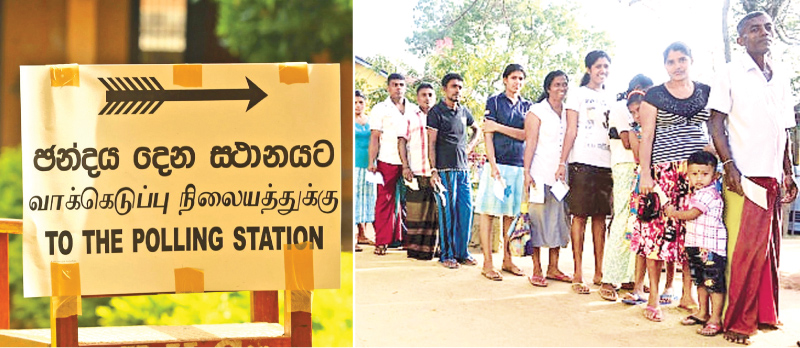A proposal by Sri Lanka’s minister of justice for a special committee in parliament on election reforms is being challenged by the main opposition Samagi Jana Balawegaya (SJB) which claims that the proposal is an attempt to delay elections.
SJB general secretary Ranjith Madduma Bandara speaking at an event said on Monday October 31 claimed that President Ranil Wickremesinghe had given an assurance to ruling Sri Lanka Podujana Peramuna (SLPP) legislators that elections will not be held.
“We are working against the president’s plan,” said Madduma Bandara.
The MP said his party plans to educate the public and raise the matter in and outside parliament to “hold elections and protect democracy”.
His SJB colleague MP S M Marikkar said at a different event that the SJB will take to the streets if elections are postponed.
“We will get on the streets to send both President Wickremesinghe and the government home, secure an election, and form a government,” said Marikkar.
The MP also claimed that the International Monetary Fund, the Asian Development Bank, the World Bank and other international organisations have said they will assist Sri Lanka in debt restructuring after the people have elected a government.
There is no evidence, however, that any of those institutions have laid down a condition that elections be held in order to receive assistance in debt restructuring.
Sri Lanka is going through its worst currency crisis in decades, and the IMF has reached a staff level agreement with the government on a 2.9 billion US dollar bailout package if Sri Lanka successfully restructures its debt.
“Without [holding an election], we cannot overcome this crisis. We ask the president not to bring in false committees to postpone elections,” said Marikkar.
Justice Minister Wijeyadasa Rajapakshe had requested Speaker Mahinda Yapa Abeywardena last week that a special parliamentary committee be appointed to propose electoral reforms for local government bodies, provincial councils and parliament and recommend a homogeneous system for all three, reports said
A parliamentary election in the island nation is not due till 2024. But the president may dissolve parliament and call an early election from March 2023. The recently passed 21st amendment to the constitution has retained the president’s power to dissolve parliament two and a half years after its commencement.
The opposition Janatha Vimukthi Peramuna (JVP) too has called for elections. Former JVP MP K D Lal Kantha speaking at a rally said the government is not going for elections because it knows it doesn’t stand a chance.
State Minister Shantha Bandara speaking to reporters on Monday claimed that the opposition is demanding elections to destabilise Sri Lanka’s economic recovery by signalling to the world and to potential foreign investors that a change in government is due next year.
The SLPP’s popularity has waned considerably since the popular people’s protests that erupted in Sri Lanka in April this year over the country’s currency crisis. A wave of protests around the country saw the ouster of then president Gotabaya Rajapaksa, who was succeeded by President Wickremesinghe – a former arch rival – with the unlikely support of 134 SLPP legislators.
Opposition parties have claimed that, in return for their support, Wickremesinghe offered sanctuary to the almost universally reviled SLPP and a delay in elections.
However, the government’s approval rating under Wickremesinghe had moved up to 10 per cent in October 2022 from 3 per cent in June, a survey by Verité Research, a Colombo-based think tank found.
Meanwhile, Palitha Range Bandara, the general secretary of the United National Party (UNP) – the party Wickremesinghe leads and is represented in parliament by a solitary MP, has said Wickremesinghe is not in it to do anyone’s bidding.


